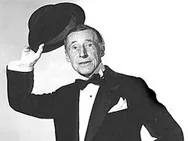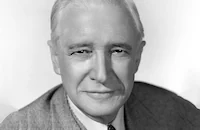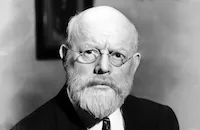The Egg and I

Brief Synopsis
Cast & Crew
Chester Erskine
Claudette Colbert
Fred Macmurray
Marjorie Main
Louise Albritton
Percy Kilbride
Film Details
Technical Specs

Synopsis
While shaving one morning, World War II veteran Bob ecstatically informs his new bride Betty that he has quit his mundane job in the city for the idyllic life of raising chickens in the country. Driving a decrepit truck crammed with livestock, the newlyweds soon venture into the mountains and arrive at their new home, a dilapidated old shack. As Bob bubbles on about their wonderful new life, Betty contends with a leaky roof and recalcitrant stove. On their first night, Bob plots a timetable for breeding livestock over the next year, including the birth of the couple's first baby. Rising before sunrise the following day, Bob and Betty are visited by their neighbor, Pa Kettle, who promptly borrows the load of wood and bucket of nails that Bob has just purchased to build a chicken coop. That afternoon, Betty is terrified when she looks up from her stove and sees two Indians, Geoduck and Crowbar, who have come to sell fish, peering through her kitchen window. Reluctant to deprive the chickens of their eggs, Betty decides instead to lead Cleopatra the pig into her pen. Just as Cleopatra pitches Betty into the mud, Harriet Putnam, the glamorous divorcee who owns the neighboring Bella Vista Farm, arrives and effortlessly coaxes the pig. Betty's next visitor is Billy Reed, a persistent traveling salesman who unsuccessfully pesters her to buy his wares. When Tom Kettle, Pa's son, who has come to help out at the farm, confides his dreams of attending college, Betty decides to visit Tom's family to plead his case. As Betty saunters down the road to the Kettle farm, she is offered a ride by Mrs. Hicks and her eccentric mother, who tactlessly predict the failure of the newlyweds' farm. At the Kettles', Betty is greeted by a boisterous brood of children and livestock. When Betty relates Tom's dream of going to college, the big-hearted, but slovenly Ma Kettle replies that the entire family is dependent upon his earnings. At Harriet's invitation, Bob and Betty visit her luxurious Bella Vista Farm, where Betty becomes jealous when Harriet begins to flirt with her husband. To rekindle Bob's ardor, Betty dons her wedding dress and in response, Bob dresses in his tuxedo. As the couple dances, Mr. Henty, a taciturn egg buyer, appears in their living room. Unimpressed by their finery, Henty leaves without agreeing to buy any eggs. When Betty, who has become friends with Ma, makes her a new dress for the big dance, Ma gives her a quilt she has just finished sewing. On the night of the party, Betty is asked to dance by a string of idiosyncratic partners while Harriet monopolizes Bob, thus infuriating Betty. The party comes to an abrupt end when the sheriff announces that the Kettles' barn has caught fire and the flames are spreading throughout the valley. Bob and Betty struggle to save their farm, but when the wind shifts, the blaze destroys their outbuildings and crops. The next morning, their neighbors rally to help them rebuild the farm, and Henty offers them a two-year egg contract. To earn money for Tom's tuition, Betty decides to enter Ma's quilt in the county fair. Upon learning that all the judges are cousins of the Hicks and consequently award prizes only to members of their family, Betty bribes Billy Reed, who is charge of the fair, to give the quilting prize to Ma. As Betty and Ma enjoy the rides at the fair, Harriet lures Bob to her farm by offering to sell him the property. After Ma's quilt is awarded first prize, Betty faints and Ma declares that she must be pregnant. That night, Betty prepares a celebratory dinner, and as she eagerly awaits Bob's arrival, Emily, an old lady, comes to the door, introduces Betty to her invisible husband and regales her with stories about vicious giant chickens. Soon after, the sheriff comes to claim Emily and explains that she used to live at the farm before going insane after her husband ran off with another woman. Late that night, a messenger delivers a note from Bob, notifying Betty that he has been delayed. In a jealous rage, Betty packs her suitcases and returns to the city to live with her mother. Over the months, Betty refuses to open the outpouring of letters that Bob has mailed her. After giving birth to a baby girl, however, she decides to reconcile with him and boards a train headed for the country. At the station, Betty hails a cab and instructs the driver to take her to Bob's house. When the driver stops at Bella Vista Farm, Betty is furious until she discovers that Bob is the property's new owner. After Bob informs Betty that he was delayed the night of the fair because he was busy cajoling Harriet into selling him the farm, they embrace and Betty produces their daughter, reminding him that they are right on schedule. Bob then dashes off to resolve another crisis at the chicken house.

Director
Chester Erskine
Cast

Claudette Colbert

Fred Macmurray

Marjorie Main

Louise Albritton

Percy Kilbride

Richard Long
Billy House
Ida Moore

Donald Macbride

Samuel S. Hinds
Esther Dale

Elisabeth Risdon
John Berkes
Vic Potel

Fuzzy Knight
Isabel O'madigan
Dorothy Vaughn
Sam Mcdaniel
Jesse Graves
Herbert Heywood
Joe Bernard
Ralph Littlefield
Jack Baxley
Carl Bennett

Howard Mitchell
Nolan Leary
George Lloyd
Robert Cherry
Joe Hiser
Joe Recht
Samuel Schultz
Joe Ploski
Hector V. Sarno
Lou Mason
Judith Bryant
Gloria Moore
Eugene Persson
Diane Florentine
George Mcdonald
Colleen Alpaugh
Teddy Infuhr
Robert Winans
Diana Graeff
Kathleen Mackey
Bobby Beyers
Bob Perry
Earl Bennett
William Norton Bailey
Polly Vann Bailey
Nella Spaugh
Vangie Beilby
Beatrice Roberts
Banjo, A Dog
Crew
Glenn E. Anderson
Carmen Dirigo
Oliver Emert
Chester Erskine
Chester Erskine
Charles Felstead
Fred F. Finklehoffe
Fred F. Finklehoffe
Russell A. Gausman
Maury Gertsman
Leonard Goldstein
Bernard Herzbrun
Jack Hively
Milton Krasner
Jack P. Pierce
Russell Schoengarth
Frank Shaw
Frank Skinner
David Tamkin

Film Details
Technical Specs

Award Nominations
Best Supporting Actress
Articles
The Egg and I
The book, a memoir of author Betty MacDonald's humorous misadventures with her first husband on a chicken farm in the Pacific Northwest during the '20s, was a blockbuster hit in 1946. Fans would have expected a major studio to acquire the rights, but they went instead to Universal-International, a new amalgamation of Universal Pictures and William Goetz's independent production company, International Pictures. The purchase of such a high-profile property was Universal's bid to regain some of its cache, and it needed the right stars to go with it. The film was the sixth of seven pairings for Colbert and MacMurray, who were sliding down a bit from their places at the top of the Hollywood pay scale by the time of the film's production. The Egg and I is considered Colbert's last commercial success.
The screenplay was written by Chester Erskine, a former playwright, and Fred F. Finklehoffe (Meet Me in St. Louis 1944). Though the story was considered watered-down by fans of the book, the film performed well at the box office. MacDonald's account was far earthier than what made it to the screen, thanks to the Production Code that was still very much in effect. The setting was moved up a few decades to 1946, so that Mr. McDonald could be a returning serviceman, looking for a new start.
The film reference Magill's Survey of Cinema noted that "As played by Main and Kilbride, Ma and Pa Kettle stole the movie of The Egg and I as easily as they had stolen the book." In fact, The Egg and I immortalized the Kettles, played by Marjorie Main and Percy Kilbride, and created a spin-off franchise that would make Universal money for years to come.
Main, the daughter of a reverend, taught acting at Bourbon College in Paris, Kentucky, traveled with a Shakespeare company and was introduced to Broadway by W.C. Fields. Though she was a success in dramatic roles such as Dead End (1937) with Humphrey Bogart, The Egg and I gave her a new career as a popular comedic character actress, which she would remain for the rest of her career. It also garnered her the film's only Academy Award® nomination in the Best Supporting Actress category, which went instead to Celeste Holm for Gentleman's Agreement (1947).
The characters continued to make audiences laugh for another nine movies. Percy Kilbride, who retired from the series after the seventh installment, was a popular comic fixture on Broadway during the '30s, though he was always hoping he'd be offered a serious role. Even after the Kettle films allowed him to live a more lavish lifestyle, Kilbride remained content to live modestly in a Hollywood boarding house.
Richard Long makes an early film appearance as Tom Kettle, the oldest and most functional Kettle child. He went on to make three more Kettle films.
Producers: Chester Erskine, Fred F. Finklehoffe
Director: Chester Erskine
Screenplay: Chester Erskine, Fred F. Finklehoffe; Betty MacDonald (novel)
Cinematography: Milton Krasner
Music: Frank Skinner
Film Editing: Russell Schoengarth
Cast: Claudette Colbert (Betty MacDonald), Fred MacMurray (Bob MacDonald), Marjorie Main (Ma Kettle), Louise Allbritton (Harriet Putnam), Percy Kilbride (Pa Kettle), Richard Long (Tom Kettle), Billy House (Billy Reed), Ida Moore (Emily - the old lady), Donald MacBride (Mr. Henty), Samuel S. Hinds (Sheriff), Esther Dale (Birdie Hicks).
BW-108m. Closed Captioning.
by Emily Soares

The Egg and I
Quotes
Trivia
This comedy was such a hit with audiences, it spawned the Ma and Pa Kettle film series.
On May 5, 1947 Claudette Colbert and Fred MacMurray starred in radio version of this film that was broadcast on the Lux Radio Theatre.
Notes
The film opens with a brief prologue in which "Betty," who is in a train dining car, explains to an unappreciative waiter, who has just dropped and broken an egg, the work that went into producing it. The order of the opening and ending cast credits differs slightly. In the opening, Percy Kilbride and Marjorie Main, who play "Ma and Pa Kettle," are listed together, and in the end credits they are separated. Although a Hollywood Reporter production chart places Ann Shoemaker in the cast, she was not in the released film. According to the Variety review, this was Universal's first big-budget picture after its merger with International. It also marked the first time that writers Chester Erskine and Fred F. Finklehoffe produced their own screenplay. For the film, they created the character of the other woman, "Harriet Putnam," who did not exist in Betty MacDonald's semi-autobiographical novel. The book was on the best seller list for over eighteen months and the film became one of Universal's top-grossing pictures in the late 1940s.
The film marked the first screen appearance of "Ma and Pa Kettle," who became so popular that Universal decided to develop a series around them. For more information about the "Ma and Pa Kettle" Series, please see the entry below for Ma and Pa Kettle. Main, who was borrowed from M-G-M to appear in this picture, was nominated for an Academy Award for Best Supporting Actress for her performance. According to a 1951 Los Angeles Times news item, the Bishop family in Northwest Washington sued MacDonald, claiming that she based the characters of "Ma and Pa Kettle" on them. The case was decided in MacDonald's favor. The proceeds from the Los Angeles premiere of the film went to the Damon Runyon fund for cancer research. The Egg and I was the last picture of actor Vic Potel, who died on March 8, 1947. On May 5, 1947, Lux Radio Theatre broadcast a radio version of the story starring Fred MacMurray and Claudette Colbert. In 1951, CBS featured a daytime television series based on the novel, starring Pat Kirkland and John Craven.














